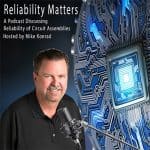
RRP 045 The Art of Reliability with Fred Schenkelberg
This week, I welcome on Fred Schenkelberg. If you haven’t heard of Fred, you haven’t been looking hard enough. Fred runs accendoreliability.com, does reliability consulting, teaches reliability at University of Maryland and hosts the Speaking of Reliability podcast. In this episode, I speak to Fred about the art of reliability. Fred answers what should reliability engineers do? What should we be learning and gives his take on what skills we need.
My calendar has been filling up lately with conferences and I wanted to let you know where I’ll be podcasting and speaking.
I will be in Chicago, Illinois at MaintenanceCon April 15-17th. I’ll be at Reliable Asset World in Clearwater Florida May 14-17 I’ll be at Asset Management Manitoba Summit on June 7th in Winnipeg, Manitoba.
I’m looking for a new opportunity in maintenance & reliability so if you hear of any open positions that I might be suited for please let me know on LinkedIn or send me an email at robsreliabilityproject@gmail.com
If you enjoy the show, please tell your colleagues in reliability about it and follow Rob’s Reliability Project on LinkedIn. I’m putting out, at a minimum, weekly videos for that page so if you follow my personal LinkedIn, you might miss out on some great stuff.
If you have any questions, business inquiries or if you’d like to appear on the podcast, email me at robsreliabilityproject@gmail.com
Follow Fred Schenkelberg on LinkedIn – https://www.linkedin.com/in/fmsreliability/
Check out accendoreliability.com
Follow Rob’s Reliability Project on LinkedIn – https://www.linkedin.com/company/robsreliabilityproject/
Follow Rob’s Reliability Project on Facebook – https://www.facebook.com/robsreliabilityproject/









 Ask a question or send along a comment.
Please login to view and use the contact form.
Ask a question or send along a comment.
Please login to view and use the contact form.